Peter MALONE
Saturday, 18 September 2021 19:29
Born Free
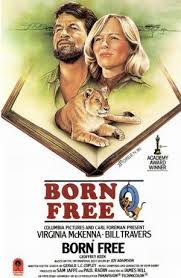
BORN FREE
UK, 1966, 95 minutes, Colour.
Virginia Mc Kenna, Bill Travers, Geoffrey Keen, Peter Lukoye, Omar Chambati, Bill Godden, Robert Young.
Directed by James Hill.
Born Free was one of the most popular films of the 1960s. It is based on the book by Joy Adamson. She and her husband George Adamson lived in Kenya in the 1950s and 1960s. George Adamson was the game warden. He kills a charging lion in self-defence and then discovers the three cubs. The film’s issue is how to train the cubs, help them survive, make a decision as to what happens to them when they grow up – to a zoo, or sending them out into the wild.
Virginia Mc Kenna and Bill Travers, husband and wife in real life, portray the Adamsons. They also did in the sequel Living Free. (Characters from Joy Adamson’s book were also taken for a telemovie in 1996, Born Free: A New Adventure, directed by Tommy Lee Wallace.)
The location photography is excellent, the photography of the lions in captivity as well as in their natural habitat set a benchmark for the kinds of documentaries which became popular on the Discovery Channel. The film won an Oscar for its musical score by John Barry as well as for its theme song, ‘Born Free’, by Don Black and John Barry, sung by Matt Munro.
The film introduced the theme of conservation and animal protection into British cinema with other films by the production company including An Elephant Called Slowly and Tarka the Otter.
The film was directed by James Hill. He directed a number of television films and television programs and also An Elephant Called Slowly as well as Black Beauty and The Bellstone Fox in the 1970s.
1. Why did this film have such great appeal on its release and its re-releases? What does it appeal to?
2. How did the title emphasise the theme of the film? What are the implications of the title of "Born Free"?
Did the song add to this?
3. Why is there such interest in lions on the part of audiences? Does the film treat the lions as equivalent of human beings, or continually portray lions as animals and their appeal to human beings?
4. In the film itself, why were the lions interesting and appealing? the situation in which they were found? The fact that Elsa was the smallest? Joy’s liking Elsa and the audience identifying with Joy, watching Elsa grow up? Watching her become part of the family life of the Adamsons, the impact of the sequences in their home? Joy’s obvious happiness in training Elsa and liking her? Did John's n objections about how Elsa would grow larger make any impact?
5. How well did the film show Joy’s attachment to Elsa and the details of her training her? Why was this interesting?
6. How well did George collaborate in the training of Elsa? How did he incorporate her training in his work? Elsa on his expeditions? (the adventurous aspect of the film?)
7. John and the comedy of his being frightened of Elsa? Yet the importance of the sequence where he told them the truth about Elsa’s future? Was he right in warning them that Elsa couldn't live with them? forever? That it would be wrong for her, that she wouldn’t be able to fend for herself? Was this a realistic approach to the lions?
8. How important and enjoyable were the sequence where George was sick, where they went on the holiday? Elsa and George and Joy enjoying the beach holiday?
9. How much suspense was there in the film when the Adamses tried to return Elsa to being wild? Why did she find it so difficult? How hard was it for Joy to enter into this process? Yet how necessary was it?
10. How happy were you when Elsa finally went wild? That she had regained her freedom to which she was born? That she would be able to cope for herself and live?
11. On the return of the Adamsons to Africa, were you hoping that they would find Elsa again? Did you think they would? How glad were you when they found her? How glad when you realised that Elsa had survived and had
become the lioness she ought to be?
12. What values were presented in this film? In the Adamsons themselves and their work in Africa? In their relationship to the people in Africa? Their concern with the animals and the future of Africa, the family life that they led, the warmth and affection that they showed to the lion and the humanity, the sacrifice that they were willing to make that Elsa lead a proper lioness's life, that they were good human beings?
13. Comment on the visual beauty of the film, the presentation of Africa. The use of colour. Was this a good film? Why?
Published in Movie Reviews
Published in
Movie Reviews
Tagged under
Saturday, 18 September 2021 19:29
Born Again

BORN AGAIN
US, 1978, 110 minutes, Colour.
Dean Jones, Anne Francis, Jay Robinson, Dana Andrews, Raymond St Jacques, George Brent.
Directed by Irving Rapper.
Born Again is the story of Charles Coulson who was involved in Watergate. He was considered a hatchet man for President Nixon and one of the sleaziest of the Watergate criminals. He served his time in jail – and during his imprisonment he had a religious conversion and was born again.
Coulson is portrayed by Dean Jones, star during the 1970s of many wholesome Disney films. Anne Francis portrays his wife. This is not a film so much about Watergate as about being born again and the religious experience – an earnest film which wants to promote conversion and being born again.
The film was directed by Irving Rapper who had a very strong career in the 1940s and 1950s directing many significant films including Shining Victory, Now Voyager, The Corn is Green, Rhapsody in Blue as well as The Glass Menagerie. He directed fewer films during the 1950s with Marjorie Morningstar and The Miracle at the end of the period. In Italy he made two films, Joseph and His Brethren as well as Pontius Pilate. He then had a gap between the Pontius Pilate film and The Christine Jorgensen Story (1970) and then Born Again in 1978. He is joined in the cast by some of the veterans of older Hollywood days including George Brent, Dana Andrews and Jay Robinson who was Caligula in The Robe and Demetrius and the Gladiators.
An interesting reflection on the Watergate scandal of the 1970s – and the possibility of someone changing their life and values. A very earnest film.
1. The dramatic and religious impact of the film? The audience expected? For those converted, born again? Or non-religious audiences? For an American audience, international audience?
2. The presuppositions in an audience about religious experience, its nature, credibility, repercussions? How convincing was the presentation of Charles Colson's religious experience? The screenplay with its inbuilt lines offering critique of the credibility of the religious experience?
3. The stars and their performances, their agreeing to perform in this religious film? Technical qualities: Panavision, colour, Washington locations, the prison background? The replaying of historical situations? Authentic newsreel footage included?
4. Audience attitudes towards Richard Nixon, his administration? To the Watergate break-in and the cover-up? Audience judgments on American politics, American morality - especially Nixon's decision to remain in office as long as possible, even with cover-ups? The justice in the exposition of the cover-ups and the administration? Audience knowledge of the events, personalities? The aftermath?
5. Audience interest in the seventies and the people who played such roles in American politics? The response to seeing people and events dramatised? How authentic?
6. Charles Colson within this framework? His loyalty to Nixon, his being the hatchet man with the mind for dirty tricks? His treatment of Daniel Ellsberg? his not being privy to the Watergate break-in and cover-up? The experience of his conversion during Watergate days, his religious activity prior to his going to trial? How credible was the religious change within this political and social climate?
7. The introduction to Colson in the film: his Washington background, his going to prison and the continued flashbacks? The presentation of his political personality, activity, legal career - hard, loyal, pleased to be in with the administration, his tactics, campaigns. relationship with his family? The contrast with his going to prison with the routine for all prisoners? His being ridiculed for his position? Audience judging him at this stage of the film, or not?
8. The film's condemnation of Nixon and his men, the forthright attitude of the film? Colson sharing this - and the scene of his listening to Nixon's resignation speech?
9. Dana Andrews' style as Tom Phillips? A credible character? Friendship with Colson, his explanation of his religious experience? the flashback to Billy Graham rally? The credibility of Co1son's conversion in talking with Phillips? The introduction to the other Washington men who were born again? Harold Hunt as the victim of Colson's tricks? His being a religious man? The irony of Colson meeting him at the instigation of friends? The interrogation, the embrace and reconciliation? The importance of Harold Hunt acting as himself - how much credibility did this give the film and the events? Hunt and his group and their prayer meetings, continued help to Colson, sustaining him in prison, the interviews? The importance of Hunt and Colson going on television with Mike Williams for a severe interrogation - and its effect on Colson? Their legal aid - even to the extent of substituting for the prison sentence for Co1son?
10. The portrait of the Colson family - conventional American family? Pattie and her continued support, her discussions about religion and her own religious background? His children and their being seen at school, university? Their being criticised by friends? Princeton and the rowing team? The importance of the arrest for marijuana and Colson’s reaction?
11. The personality of Dave Shapiro - his background as lawyer, causes especially his discussions about the Hollywood Ten, his Jewish background? His concern about Colson, their partnership, his decision to help? His criticisms of Colson's stances? His scepticism about the religious experience? The presentation of the case to Judge Gesell? Gesell's listening to the case, his arguing Shapiro down, the sentence?
12. The credibility of the hostility towards Colson? His decisions about pleas, discussion with his children, with Dave Shapiro? The repercussions of the strong sentence?
13. The prison sequences and the echoes of prison films? His arrival, the friendship with Jim, the threats by Scanlan and the killing attempt? The friendship with Paul Kramer? The detail of life in the prison - dormitories, meals, riots, work, recreation? The visits and the introduction of Jim’s father to Pattie? Colson at prayer, the prayer
group and the discussions, the prayer for Jim’s parole and its effect? how convincing the presentation of prison?
14. The effect on Colson of his prison experience? The prayer group and his involvement after release in prison chaplaincy work?
15. The religious aspects of the film and their particularly American tone? How similar to international audiences' religious experience?
16. The film reflecting the politics and social attitudes of the seventies, social change, religious change?
17. The type of Christianity presented - conversion experience, Billy Graham and his rallies and their spirit, reliance on the Bible, good works?
18. Cinema as a vehicle for films with religious message? How much was the message communicated through the drama and the biography, how much through the specific moralising?
Published in Movie Reviews
Published in
Movie Reviews
Tagged under
Saturday, 18 September 2021 19:29
Bootleggers
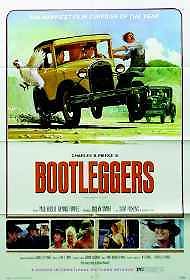
BOOTLEGGERS
US, 1974, 110 minutes, Colour.
Paul Koslo, Dennis Fimple, Slim Pickens, Jaclyn Smith.
Directed by Charles B. Pierce.
Bootleggers is one of the many action adventures, small-budget, directed by Charles B. Pierce (Winterhawk, The Winds of Autumn, The Town That Dreaded Sundown, Gray Eagle – all in the 1970s).
The film is familiar enough in its plot – bootleggers, killings, revenge. The film is notable in retrospect for the appearance of Jaclyn Smith who was to go on to be one of Charlie’s Angels.
1. The indications of the title, themes, tone?
2. The film as a piece of Americana, reflecting an era, attitudes? Impact for American audiences, overseas audiences?
3. The film was to a large extent the personal work of Charles B. Pierce. He wrote, directed, photographed. Did the film reflect a personal point of view on events, characters, themes, America? The quality of the insight of Pierce?
4. How important was the atmosphere of Arkansas, wide screen, colour, landscapes, colouring for the landscapes of American memory? The songs and the music of the hill-billies and the bootlegging communities?
5. What comment did the film make on the American heritage of the twenties and thirties with bootlegging, prohibition, the depression, the abuses, violence, vengeance, family feuds, outside business controls, law and order and the application of justice?
6. The film's attitudes towards the families, the background of their feuding, the violence of the feuds and the effect on families, especially with death? A reflection of the times? The rights and wrongs of the feud?
7. Initial response to the Woodall murder of Othar’s father? Setting a tone for the rest of the film and the violence?
8. Othman as the central character: his strengths of character as a man, memories of his boyhood and the death of his father, the bonds with Dewey? Their work on the farm, their skill in distilling whisky? Victims of the thirties? Of depression? The choices open to them in the world in which they lived? Credible mountain people?
9. The presence and impact of Grandpa? As the patriarch of the family, the distilling of the whisky, the bootlegging itself? His influence on Othar? His practical wisdom? The violence of his death and its significance for the plot?
10. The contrast with the Woodalls as presented unsympathetically, the trucking, McClusky?, the violence consequent on the feuds and the transport of the liquor? How well was this illustrated?
11. The change of tone with Sally and Leola: boys and girls in this atmosphere, town? The girls, work at the beauty parlour and the humorous sequences of meeting the boys? The swimming and the taking of the clothes? The irony of the humour leading to the question of the gun? Gaol for Othar and the change of mood from frivolity to seriousness? The girls and their reaction in the rest of the events?
12. The portrayal of the law, the gaol? The big sequence of the pulling down of the gaol? Balanced by the building of the new one? The irony of Othar and Dewey as deputies and the way that they administered the law, the bias against their rivals?
13. How did this lead to the build-up to the siege? Grandpa's death? The atmosphere of vengeance? The setting of the house, the Woodall family and their occupation, characters, reaction to the siege, violence? The impact of the child and the violence ensuing especially for Dewey?
14. How well drawn was the character of Dewey, in comparison with Othar, the bond between the two, his being wounded?
15. The irony of the ending? The attitude of letting Othar and Dewey go free? Attitude towards law, attitude towards justice and those who didn't have the law on their side?
16. The film within the genre of the seventies of bootlegging heroes, vigilante work, personal administration of justice, feuds and hate?
Published in Movie Reviews
Published in
Movie Reviews
Tagged under
Saturday, 18 September 2021 19:29
Boot Hill
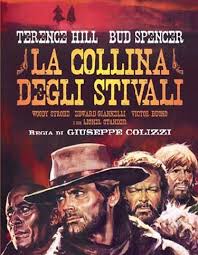
BOOT HILL
Italy, 1969, 100 minutes, Colour.
Terence Hill, Woody Strode, Bud Spencer, Eduardo Ciannelli, Victor Buono, Lionel Stander.
Directed by Giuseppe Colizzi.
Boot Hill is one of the many films made with Terence Hill and Bud Spencer. They were very popular in Italy and then internationally with the spoof western They Call Me Trinity. They made a sequel, Trinity Is Still My Name. This film tries to capitalise on that popularity by having a subtitle: Boot Hill: Trinity Rides Again.
The couple made westerns but also a whole range of action adventure films and comedies during the late 60s and during the 1970s. The film is of interest as one of the many spaghetti westerns made during that period, using Italian stars (with American-sounding names) and having some veteran American character actors in supporting roles. This reached a peak with the films of Sergio Leone with Clint Eastwood, A Fistful of Dollars, A Few Dollars More, The Good, the Bad and the Ugly. Leone also made at this time Once Upon a Time in the West with Charles Bronson and Henry Fonda.
1. A good Western? Was it a conventional Western? Was it merely an entertaining Western?
2 How important were the director’s styles for this film, his use of colour, close ups, the use of the circus atmosphere, colour, subjective shots, etc.? Were these done well or overdone? Did they contribute to or distract from the film? The use of the circus for the film - how did it make the film different? Was it effective? The circus master, the dwarfs, the acrobats etc.?
3. The use of the Shakespearean mime at the end. Was this used well? How did the serious side of the film receive its focus in this mime? How well did the director use audience understanding of Hamlet for this device? Why did the film exploit modern trends in Westerns, especially violence?
4. The theme of vengeance - where was justice administered in this kind of West? Who had the responsibility for law and order? How important was revenge? Was it ever justified? What right did the miners have to turn on their exploiters?
5. The fights - were they humanely and genuinely portrayed? Were they merely sensationalistic?
6. Even though this was a spaghetti western, did it make some point?
Published in Movie Reviews
Published in
Movie Reviews
Tagged under
Saturday, 18 September 2021 19:29
Boom
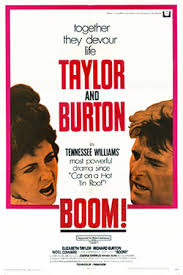
BOOM
US, 1968, 113 minutes, Colour.
Elizabeth Taylor, Richard Burton, Noel Coward, Joanna Shimkus, Michael Dunn, Romolo Valli.
Directed by Joseph Losey.
Boom is based on the play The Milk Train Doesn’t Stop Here Anymore by Tennessee Williams. It is an eccentric story of a woman living on an island in the Mediterranean, Sissy Goforth, played by Elizabeth Taylor, who is dictating her memoirs and having injections to keep her alive. A strange character, nicknamed the Angel of Death, turns up on the island. He appears just when elderly women are going to die. He is played by Richard Burton. One of the flamboyant neighbours who comes to meals at the villa is the Witch of Capri played by Coward himself.
The film was criticised at the time as being partly incomprehensible, a camp version of Tennessee Williams’ plays, a strange vehicle for Elizabeth Taylor and Richard Burton. However, some people consider it a camp masterpiece.
The film was directed by Joseph Losey who had had a successful career in the United States in the 1940s especially with such films as The Boy With Green Hair and The Prowler and M. A victim of the blacklisting, he moved to the United Kingdom and made films under pseudonyms including The Sleeping Tiger and The Intimate Stranger. However, he kept making films in the UK using his own name from the mid-50s. He had great success in the 1960s with a series of films including The Damned, The Servant, King and Country, Modesty Blaise and Accident. He then made Boom and Secret Ceremony with Elizabeth Taylor. He had a mixed career during the 70s and 80s, sometimes working in England, sometimes working in France. He made a film version of Mozart’s Don Giovanni in 1979. His last film was Steaming based on the Nell Dunn play starring Vanessa Redgrave and Diana Dors.
1. 'What was the ultimate impact of this film? was it interesting and did it sustain interest? Was it easy to suspend disbelief in the characters and themes of this film?
2. The impact and meaning of the title? Boom and its sound, explosion, the waves on the shore (visual aspect of this, moments passing, life and death? The number of times it was spoken by Chris? The production name was ‘GoForth’, how appropriate was this for the film and its theme of death? Williams' original title was The Milk Train Doesn’t Stop Here Anymore’. Chris and the drinking of milk, ‘Go Forth’, saying of this sentence? With reference to death?
3. Was it obvious that this film was based on a stage play? The nature and quality of the dialogue? The limited sets - the sea and the house? The opening out of these sets for film purposes? The Italian background? The outdoor location, sea and sky? The decor of the house and its modern aspects? The animals? The sounds and the music?
4. Audience response to wealth and rich decadence? To jaded rich people and the jet set? To their happiness and unhappiness? The style of life of the rich-idol, preoccupation with self, hypochondria, bitchiness? how appropriate was this setting for the film?
5. The importance of the theme of death, quality of life, especially of Cissy to go forth? The discussion of moments and memories and their passing? The search for the meaning of life - as an introduction to GoForth’s? chapter? The achievement of life? The wealth cannot be taken into death? The nature of fear and death, panic? Go Forth’s panic on heights? The boom of death? Inviting death and needing someone to help the person through death?
6. The angel of death theme? the conventions that we use to communicate it – coming out of the sea, climbing the mountain, confronting the dog guarding the palace, the title of the film, the dress and the sword? The musical overtones of death, fascinating and repellent? People needing the angel of death? Greek mythology of guides through death? The Christian references to last judgment and the gospel overtones? The angel of death’s Hindu story about helping the old man to die? The angel of death bringing God to Cissy Goforth? The angel of death poured into the sea with jewellery? How well integrated into the film were these themes of the angel of death?
7. Madame Goforth - a typical, rich and modern woman? The importance of her wealth, her interest and self pity, hypochondria and nerves, dependence on drugs, place in society? A twentieth century woman, dying, pain and fear, her bitchiness, her loneliness and waiting to be alone? Her background of husbands, her wanting a lover? The device of her telling her memoires? Having a bodyguard, whether she wanted the truth or not? The talk of memories or moments? Her cynicism? Her final facing of death? Her being absorbed in the sea? Elizabeth Taylor’s style, fashions and jewels? make-up? surface respectability and real coarseness? Her interaction with all the characters?
8. The character of Christopher Flanders as distinct from the angel of death? Richard Burton and his stage style? A poet? His love for Blackie? Being chased by the witch of Capri? By being battered by Rudy and the dogs? How real as a person and his final cynical smile? How well integrated was the real character of Christopher Flanders with his symbolism as the angel of death?
9. The function of the witch of Capri in the film? Jet set tone? One of the beautiful people? cynical, smart, a man of the world, tormenting others? The homosexual overtones, his being carried in on the shoulders? Bird noises? His proposal to Flanders? How appropriate was the portrayal and how did it affect the mood of the film? As portrayed by Noel Coward?
10. How real was the character of Blackie? How normal did she seem in comparison with everyone? From a different class of poverty, abused, a widow? Her different experiences from the others? Her emotions? Reactions to Mrs Goforth? The place getting on her nerves, her sympathy for Flanders and the dogs? The dictation and its style throughout the house? The effect for Rider's love for her? Her change of appearance and dress? The significance of her final abuse of Mrs Goforth? Her presence at the end?
11. The role of the doctor and their experiments? Mrs Goforth pushing the machine over the cliff?
12. The oddness of Rudy as a dwarf bodyguard? His brutality? The dogs?
13. The death of Mrs Goforth, her being robbed of her jewels? Being liberated from wealth? Being absorbed into the sea?
14. How seriously was this film meant to be taken? Did it seem to be too arty for full impact? How well was the drama integrated into the themes? The use of symbols, Italy, an island, of memories, of jewels? The transition from comedy tones to serious tones?
15. Was this film a cinematic success?
Published in Movie Reviews
Published in
Movie Reviews
Tagged under
Saturday, 18 September 2021 19:29
Bookseller Who Gave Up Bathing, The
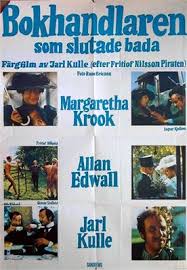
THE BOOKSELLER WHO GAVE UP BATHING
Sweden, 1969, 99 minutes, Colour.
Allan Edwall, Margaretha Crook, Jarl Kulle.
Directed by Jarl Kulle.
The Bookseller Who Gave Up Bathing is an entertaining period piece from Sweden in the late 1960s. Veteran actor Alan Edwall, who appeared in some of Ingmar Bergman’s films, plays a bookseller in a country town in Sweden in the 19th century. A group of men go bathing every Sunday as a ritual. The bookseller is not interested in women – until Amelie arrives in the town. She is played by Margaretha Crook who also appeared in a number of Swedish films for eminent directors like Bergman. Also in the cast is the director Jarl Kulle who also adapted the book for the screen. Kulle appeared in Bergman’s Fanny and Alexander and had a significant role in Babette’s Feast.
The film is a detailed and often charming look at eccentric characters, the style of life in a more placid 19th century, a glimpse of Swedish humour.
1. The classic status of this Swedish film? Its quality, interest and impact?
2. How particularly Swedish was the film in plot, characterisation, atmosphere, issues? Its impact on Swedish audiences, non-Swedish audiences? How universal its themes and application?
3. The contribution of the colour photography, the rural city life? The world of 1900? The music and its atmosphere? The presentation of the town, the city, homes especially the bookseller’s? The summer sequences and the men bathing as a recurring picture?
4. The film was based on a social and humorous novel. Was this evident? How well was it translated to the screen?
5. The focus of the title on the bookseller, his story and the irony of the ending? How appropriate was the explanation for his giving up bathing? The irony?
6. The importance of the prologue and the bookseller's visit to the city with Kracow? The memories of the ideal girl? the search? Kracow's reaction and his mistake? The difference between idyll and reality? how did this theme pervade the film? Its application to the bookseller and his idealising of Amelie?
7. How well drawn was the portrait of Jacob? His way of life in the town, his character with its strengths and weaknesses, his work in the bookshop?
8. The bookshop as a symbol of his character and his way of life? The confirmed bachelor? His outings with his friends and their bathing and reading? The good humour and placid way of life?
9. The introduction to Amelie in this world? Her arrival at the station, her verve and vitality, her status as a widow, the stories about her past and her vital conversation and spreading of the stories? A strong and passionate woman?
10. How credible was the romance between Amelie and Jacob? The possibilities for a happy future? The transformation in him? The change in her? Their bonds with one another? How is this symbolised in her transforming of the house and all its furnishings?
11. How well did the film create the atmosphere of happiness and romance? The transition then to the revelation of the photos and the ugliness of the truth? Amelie’s brother and the dramatic revelation at the celebration?
12. How important was Jacob's attitude towards Amelie? His horror, forgiveness?
13. The contrast with Amelie's deterioration, her obscenity, drink, her appearance? The pathos and the sympathy of the filmmakers towards Amelie's plight? Did she deserve such punishment? Jacob's confusion in how to treat her? Even though he had forgiven her?
14. The pathos of her death and his reaction especially with the headstone? How did his memory of her change over the years? How was she transformed into a happy memory?
15. The curiosity value of his giving up bathing? The pathetic irony of his explanation of what had happened and the fact that Potiphar could not be read without a mirror? The irony of the name of Potiphar and its biblical overtones?
16. How much insight into human nature, truth about life? Its possibilities, the transitions and transformations in peoples' lives? The possibility of happiness and romance? The reality of pain, suffering and tragedy?
Published in Movie Reviews
Published in
Movie Reviews
Tagged under
Saturday, 18 September 2021 19:29
Bonnie Prince Charlie
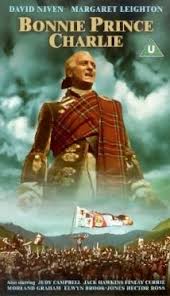
BONNIE PRINCE CHARLIE
UK, 1948, 135 minutes, Colour.
David Niven, Margaret Leighton, Judy Campbell, Jack Hawkins, Finlay Currie, John Laurie, Hugh Kelly.
Directed by Anthony Kimmins.
Bonnie Prince Charlie is a very ambitious film, made in the United Kingdom only three years after the end of World War Two. While there had been strong British film-making during the war, especially at Gainsborough Studios, the post-war years saw some attempts at re-creation of older British history (Saraband for Dead Lovers about the beginning of the Hanoverian rule in England).
The film is about the Scottish rising in the 18th century against the British. Prince Charles Stuart was the last of the Stuart dynasty from Scotland who came to rule in England after the death of Elizabeth and the end of the Tudors. Charles I was executed, Charles II achieved the Restoration, his brother James was attacked by the Protestants and was defeated at the Battle of the Boyne in 1690. His Catholic lineage included two grandsons, Prince Charles and Henry who became a priest and a cardinal in Rome. Charles Stuart led an uprising in Scotland – and advanced into England, not all that far from London and then retreated. He was eventually beaten at the Battle of Culloden.
David Niven is rather debonair as Bonnie Prince Charlie. Margaret Leighton is the heroine Flora McDonald?. (There was a 1923 version of Bonnie Prince Charlie with songwriter Ivor Novello (who appeared in Hitchcock’s The Lodger) as Bonnie Prince Charlie and Gladys Cooper as Flora McDonald?.
The film was directed by writer-director Anthony Kimmins. Kimmins directed a number of films in the 1930s and 1940s and such idiosyncratic films as Mine Own Executioner as well as the comedy The Captain’s Paradise. He made two films in Australia in the 1950s, Smiley and Smiley Gets a Gun.
1. The appeal of costume drama, historical adventure, history? A past age, romance and danger? The legendary aspects?
2. The appeal of the Stuarts, for the English, for Scotland? The history of a rebellion. of a charming prince, history of lost hopes? How well did the film present these?
3. The use of colour, Scottish locations, the re-creation of the Eighteenth century settings?
4. The status of Scotland in 1745, the opening,, the dominance of the Hanoverian kingdom, the influence in Scotland, the Scottish patriotic songs and their being banned, the gradual subjugation of Scotland, the union with England? The weakness of the claim? Past dreams and memories? Hopes and the realism of their fulfilment? Romanticism? How well did the film capture and present this?
5. The contrast with the Stuarts in Rome, their plans, loyalties, dreams? Were they realistic? King James in exile, the legacy of Bonnie Prince Charlie?
6. The character of Charlie and his hopes? His involvement in the enterprise, sailing to Scotland, the drama of his arrival? A man of skill, a possibility as an English king? The irony since the audience knew of the failure of his attempt?
7. The calling of the clans and the heightened patriotism and expectations? The discussion about joining the rebellion, the various motivations, the trust in the prince? What did the clans hope for?
8. The contrast with Murray, his service with the Hanover regime, his self-absorption and military skill? His standing up to the princes, his pride? His acknowledgement of the prince's skill in the victory when the soldiers went through the marches? The tribute of the English soldiers? The glamour, the isolation and so near to London? The decision for the retreat? The drama of the prince's appeal and nobody listening to him? The irony of the English bluff? The retreat, the disaster at Culloden? Murray’s acknowledgement of his error? The prince and the hopelessness of his cause?
9. The effect on the clans, the effect on Charles and his becoming a fugitive, British justice, spies and searching him out? The dangers for the prince, the support of Donald?
10. The role of Flora McDonald? Her character, her role in the household of her stepfather, her skill, encounter with the prince, the details of her helping him and the persons she enlisted? The help of the boat captain, the people on Skye? Her sharing the dangers with him in the fog? Her achievement, her place in history?
11. The picture of the English pursuers and their vengeance, their torture and their harshness?
12. The atmosphere of patriotism, especially with the music and the popular songs? What had Prince Charlie achieved in fact? In legend?
Published in Movie Reviews
Published in
Movie Reviews
Tagged under
Saturday, 18 September 2021 19:29
Bonjour Tristesse
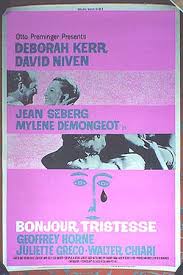
BONJOUR TRISTESSE
US, 1954, 98 minutes, Black and white/Colour.
Deborah Kerr, David Niven, Jean Seberg, Mylene Demongeot, Geoffrey Horne, Jean Kent, Walter Chiari, Juliette Greco, Martita Hunt, Roland Culver.
Directed by Otto Preminger.
From the novel by Francoise Sagan, her first novel. A Certain Smile was also filmed by Jean Negulesco about this time. The film teams David Niven and Deborah Kerr, who in this year also made Separate Tables. They were teamed in such films as Prudence and the Pill, Eye of the Devil and Casino Royale. Jean Seberg is the star and she had made her debut for Otto Preminger in the previous year in Saint Joan .
Otto Preminger made his mark in a wide variety of films from Laura to Carmen Jones to Exodus . He defied the
codes of Hollywood with The Moon is Blue and Hurry Sundown. Bonjour Tristesse is interesting for its use of wide screen, Riviera settings and the pink and black style for the sad memories of the rich life in Paris. A soap opera stylishly done.
1. How interesting and enjoyable a romantic melodrama? The film as soap opera? Its presentation of the wealthy life? The world of reality, fantasy?
2. The credits and their design, irony of wealth? The stars and their styles? Francoise Sagan's reputation at the time, later? A young French woman's view of this kind of world?
3. The use of colour, especially to indicate reality and unreality? Wide screen locations of the Riviera and Paris? The emphasis on the wealthy life, the fashions, parties? The melancholy of the title song, its lyrics?
4. The significance and tone of the title? The French overtones? Melancholy, boredom, guilt? The emptiness of life and the vanity of vanities theme?
5. The narrative device with Cecilia speaking, the flashbacks from her point of view, her comment on what happened? her moral estimate of people and of the situations? The audience sharing her view, differing from it?
6. The atmosphere of the opening with the emphasis on Paris, raciness, cars and speed, parties and superficial talk, the possibilities of boredom and repetition? Cecilia and her moving within this circle and her boredom? The transition to the Riviera and holidays? The Paris framework for the story and the irony of the ending, with the audience knowing what had happened, Anne's death? Cecilia looking into the mirror making herself up and the lyrics of the song?
7. How attractive was Jean Seberg in the central role? Her age, appearance, vitality? Her relationship with her father and imitating his way of life? Her enjoyment of his company, the intimacy between them, the way of life at the parties, wealth? Her boy friends, her permissive attitudes? What future did she have? How was she affected by her experience at the Riviera, adult life and emotions, playing with life and death? How did this change her? For the better? What future would she have after the film's ending?
8. David Niven's style as the aging playboy, his flirtations, his participation in the wealthy idle life, his infatuation with Anne, his relationship with his mistress and discarding her for Anne, his falling in love, sharing Anne's point of view, strictness with Cecilia? The comparison of the Lombards and their way of life? His falling into Cecilia’s trap, flirting with his mistress? The effect of Anne's leaving and her death? His realization of himself and his honesty to himself but inability to change, the influence of Anne’s death on his life, his resuming the playboy round? How would he live with this knowledge?
9. The possibilities of a happy life for Cecilia? Her friendship with the neighbouring boy, the lyrical scenes of their meeting on the beach, their friendship? Anne and her disapproval? Cecilia leading him into the fantasy world of the wealthy, the parties? His participation in Cecilia’s plan? His reaction to Anne's accusing him of improper behaviour? His resuming his studies?
11. Anne as the focus of the film? The expectation of her arrival, Deborah Kerr's presence and style, her initial angers, her primness, her being accused of being a prude, her overcoming of this? Her enjoying the holiday world of the Riviera? Her background in fashion design and her skills, her poise? Friendship with Raymond? Falling in love. the ball sequence and her uncertainty? The sequence of her asking Cecilia’s permission for the marriage? Her changing their lives, her strict approach. studies? Her criticism of the Lombards? The audience judging Anne by her behaviour and words and also hearing Cecilia’s comments?
12. Anne as the victim of Cecilia's plans, her cruelty in effecting the details, discussing them with the audience, her relentlessness? The involvement of the young people in the plan?
13. The emotional impact of Anne's discovery of the truth about Raymond, her death? How deliberate, how considerate to the others with the accident?
14. The presentation of the giddy world of the Riviera - the neighbours and the boy's mother and her interest in gambling, Raymond's mistress and her luck, the Lombards, the playboy from South America and his gambling? A background for understanding the central characters and the themes?
15. The moral tone of the film and its presentation of these characters. their way of life - asking for judgment on them?
16. The basic ingredients of popular soap opera - how well presented, for entertainment, for reflection?
Published in Movie Reviews
Published in
Movie Reviews
Tagged under
Saturday, 18 September 2021 19:29
Body and Soul
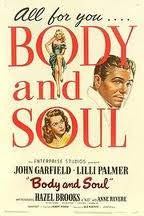
BODY AND SOUL
US, 1947, 104 minutes, Black and white.
John Garfield, Lilli Palmer, Hazel Brooks, Anne Revere, William Conrad, Joseph Pevney, Lloyd Goff, Canada Lee, Virginia Gregg.
Directed by Robert Rossen.
Body and Soul is considered one of the classic boxing films. It is part of a group of films on this theme from the late 40s including Robert Wise’s The Set-Up? and Stanley Kramer’s Champion. It is considered to have been a strong influence on other boxing films including Somebody Up There Likes Me with Paul Newman as well as the classic Raging Bull with Robert de Niro.
The film was directed by Robert Rossen, a writer who began directing in the late 40s and was to go on to win an Oscar for his film All the King’s Men, the best film of 1949. Rossen was interested in action and made The Magnificent Matador about bullfighting, the western They Came to Cordura and his classic film, The Hustler, with Paul Newman and Piper Laurie.
The film was written by Abraham Polonski, a prolific writer who was blacklisted and who started to direct films in the 1940s, with Force of Evil with John Garfield, but could not make another film until the late 60s with Tell Them Willie Boy Is Here, with Robert Redford and Katharine Ross.
John Garfield was nominated for his performance as a young boxer. He wins a bout, his mother (Anne Revere, mother of so many characters in films including her Oscar-winning performance in National Velvet) is unwilling for him to box but straitened circumstances demand it. William Conrad appears as the manager. However, after great success, he is put into a situation where he has a corrupt manager, is asked to fix fights, and is in a morally difficult situation.
There is a good supporting cast with Lilli Palmer, who came to England from her native Poland, and began a career in the United States at this time. Joseph Pevney also appears – but was to make his name as a director. Canada Lee, who was to appear as the reverend in Cry, the Beloved Country, is also in the cast.
1. Audience interest in boxing films, the impact of the sport, the human background? Impact in the 1940s, now? The tradition of boxing films?
2. The contribution of black and white photography, the boxing sequences especially in the final fight, life in the American city, the picturing of the background of the rackets, the wealthy life? Musical score?
3. Response to the title? Indication of theme and selling oneself body and soul?
4. The importance of the structure: the opening tracking sequence and the revelation of Charlie and his calling out 'Ben’? The repetition of this exact same sequence later in the film with our knowledge of what had happened? The effect on the audience of the repetition? The realisation of what we had learnt? Building up for the finale? Making Charlie’s final actions credible?
5. The qualities of John Garfield's performance as Charlie Davis? As representing a tough urban type, his appearance, manner of speaking, swagger? Transition from naive and ambitious young man to greedy and money-fixated punk fighter? The importance of his first learning of his response to Ben and his death, the impact of his drive and ignoring people calling him ‘Champ’, the hostile reaction of his mother, Peg and her love and her repulsion? The setting of a mystery about his attitudes and behaviour? The seeking out of Alice and her comments? The build-up to the fight and our knowledge of its being fixed, the role of Roberts and his hold over Charlie?
6. The placing of Charlie’s memories and sleeping, the dream memory? The night before the fight and the troubled conscience? The sleep immediately before the fight? How did this make the fight and his behaviour credible? Our interest in Charlie as he went to fight, the audience response to the fight itself, audience loss of interest and their booing, Charlie’s reaction to the discovery of the fix against him, the betrayal of Quinn and the others, his decision to change, his fight and achievement? Quinn and his disgust? Alice and her money and having to return to Quinn? Peg and her exhilaration? Ben's trainer and his enthusiastic congratulations? The importance of the confrontation with Roberts and the final remarks of Charlie that everybody has to die? his final achievement and the optimistic ending?
7. The portrait of Charlie as a young man and at home? Champion in the local club, fresh enthusiasm, friends? The shyness and awkwardness of his dancing with Peg? Going home with her, their chatter, the drawing, her manoeuvres, the kiss? Irma and her presence? Peg as a strong heroine for the film? Her love for Charlie, support of him? Her presence at the interview with Robert, her knowledge of the deals, Shorty's place? Her presence at the banquet and the celebration, her response to Shorty and persuading him to help Charlie, her witnessing his death? Her values and expression of these, judgement on Charlie and his behaviour? The fact that Charlie leant on her over the years? Her hopes, the return to his mother? Her reaction to the fixing of the fight? Her presence and her joy at his stance, standing beside him for so long after being rejected?
8. The significance of Charlie’s father giving him the money, should he have done this for Charlie’s benefit? The rough neighbourhood and his death? Mrs Davis and her strength, presence, her articulated dislike of boxing,
watching what happened to Charlie, observing his wealth, returning to the shop, her disgust at his behaviour, treatment of Peg? Her reaction to the knowledge of his fixing the fight?
9. The importance of filling in the background - friendship with Shorty and his help, his giving him money, Shorty's disillusionment, the fight, standing by Ben, disappointment and his death? Quinn and the poolroom, the intermediary manager? His help and presence? Roberts and his wealth, the deals, his henchmen, power? Running the rackets? How ugly a character was Roberts?
10. The contrast with Ben, his trainer, their deals and his fighting with the blood clot, illness, hospitalisation? Shorty’s sympathy and then his death? Charlie’s help, Ben's working for him and training? The ordinary friendship especially the picture of friendship of equals, between black and white in the 40s? His confrontation of Roberts, his fall and punch-drunk attitudes, pathos of his death and its effect on Charlie?
11. Charlie's early decisions against Peg, for money and the easy life? The effect of the kaleidoscope of the years with his easy life, spending the money and letting it slip through, infatuation with Alice, parties and the night after?
12. The ugly look of rackets in the sporting world and the film's presentation of them, judgement on them?
13. Themes of boxing - how much emphasis on skill, sport, endurance? The picturing of few fights? The impact of the boxing visuals?
14. The theme of American dreams, the souring of the dreams? The effect on self-seeking, selling oneself body and soul? The effect on relationships and the meaning of life? Even to death? The possibility of redemption?
Published in Movie Reviews
Published in
Movie Reviews
Tagged under
Saturday, 18 September 2021 19:29
Bobo, The
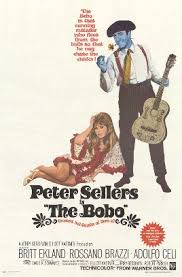
THE BOBO
US, 1967, 105 minutes, Colour.
Peter Sellers, Britt Ekland, Rossano Brazzi, Adolfo Celi, Hattie Jacques, Ferdy Mayne, Kenneth Griffith, Al Lettieri, Marne Maitland.
Directed by Robert Parrish.
Audience Expectations of Peter Sellers films were very high by the mid-60s, especially after his international appeal as Inspector Clouseau in The Pink Panther and A Shot in the Dark. However, he made a number of films which disappointed audiences at the time including After the Fox and I Love You, Alice B. Toklas. However, in retrospect this is a slightly more serious comic character from Sellers. He plays a former matador wanting to get back into the business – but is required to woo a gold-digger, played by his then wife, Britt Ekland. The film has some character actors in support including Italians Rossano Brazzi and Adolfo Celi as well as the British Hattie Jacques and Kenneth Griffith.
The film is comic in its way but has not maintained a strong reputation like so many others of Peter Sellers’ films. The director is Robert Parrish who began making small crime films in the early 1950s and moved to England for some films including The Purple Plain with Gregory Peck. However, in the United States he made a number of westerns including Saddle the Wind and The Wonderful Country.
1. The meaning of the title and its tone?
2. How convincing and important was the atmosphere of Spain? The credits’ look at Barcelona? The Spanish characters, songs?
3. How good a Peter Sellers comedy was this? The particular characteristics of this kind of comedy, their use?
4. The conventions of farce, mistaken identities, wealth, sex-comedy? How well were these conventions used, how entertainingly?
5. What were the important themes for the focus of the film’s meaning? Giving point to its comedy? Juan as the poor man and ambitious? Olympia as mercenary and tricking people? The mutual trickery?
6. How important was it for the film to turn on Olympia? The beginning of the film focusing on her, her greed, her blackmailing mercilessly of the salesman, her using of her admirer and then rejecting him? The indignation of the entrepreneur and his vengeance? How was this balanced by the devotion of Trinity, her maid? The presentation of her quick changing of moods in looking for the Count? What kind of girl was she? How normal? Did she have any redeeming features?
7. How important for the themes of the film was it for Olympia to be tricked? The lure with the coat, her waiting for the king, the moral comment? Juan as the vehicle of this deceit? Her attitude? The redeeming of her mercenariness by some kind of feeling and love? Was this convincing?
8. How enjoyable was Juan in Peter Sellers' style? The Bobo, the matador from the country, his singing, persistence, drive? His relationship with the entrepreneur? The conditions and his accepting of them? The humour of his devices for tricking Olympia? His entry into the role of the king's confidant? His ability to rescue a situation? For example, with the coat, with the lavish dinner? How did he fall In love with Olympia? The change in him? How satisfactory was the resolution? The discovery of the truth? Was the painting of the Bobo blue a sufficient vindication for Olympia and for Juan?
9. Juan going on to be the singing matador, Olympia gaining a husband and wealth?
11. How good a comedy? What were the high points? A comedy of manners and morals?
Published in Movie Reviews
Published in
Movie Reviews
Tagged under